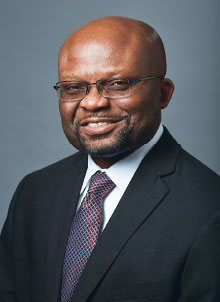Congress Hears Testimony on Need for Robust MH Crisis Services
Abstract
In testimony before Congress, Charles Dike, M.B.Ch.B., M.P.H., emphasized the importance of developing strong continuums of crisis care services so people experiencing psychiatric crises can avoid unnecessary encounters with law enforcement and lengthy waits in emergency departments.
By July 2022, 988 will become the universal, three-digit telephone number for the National Suicide Prevention Lifeline (1-800-273-TALK). It will operate as a mental health crisis hotline system that can also connect individuals experiencing a crisis to local community resources when necessary.

“Every single individual in crisis is one person in crisis—they all have different needs,” says Charles Dike, M.B.Ch.B., M.P.H.
Yet communities must have the infrastructure required to respond to these calls, just as EMS, police departments, and fire response services are available to respond to calls made to 911, Charles Dike, M.B.Ch.B., M.P.H., told legislators during the congressional hearing “Mental Health Emergencies: Building a Robust Crisis Response System.”
“Success in the future depends on strengthening and funding the mental health infrastructure by treating evidence-based, community crisis systems as essential community services necessary for 988 implementation,” said Dike, an associate professor of psychiatry at Yale University School of Medicine, medical director of the Connecticut Department of Mental Health and Addiction Services, and chair of APA’s Ethics Committee.
The hearing was held by the Labor, Health and Human Services, Education, and Related Agencies Subcommittee of the House of Representatives Appropriations Committee. It is chaired by Rep. Rosa DeLauro (D-Conn.), who is also Dike’s representative in Congress. Dike was joined by Steven Casstevens, immediate past president of the International Association of Chiefs of Police; Robert Gebbia, CEO of the American Foundation for Suicide Prevention; Tonja Myles, a certified peer support specialist and community liaison for RI International and the Bridge Center for Hope in Baton Rouge, La.; and Chris Richardson, L.C.S.W., associate director of criminal justice services with the Mental Health Center of Denver.
In his opening statements, Dike explained that communities across the country do their best to patch together various types and levels of mental health crisis response services with insufficient resources. “This patchwork typically relies too much on emergency departments and police departments and can result in patients languishing in emergency rooms, criminalization of persons with mental health and substance use disorders, and, at times, the unnecessary and tragic loss of life,” Dike said.
The ideal crisis response system provides a person in crisis with three things, Dike told the subcommittee: someone to talk with, someone to respond, and a place to go. Crisis call centers fulfill the first need by providing individuals in crisis with a person they can speak with. Mobile crisis teams are able to respond to a person in crisis wherever they are in a defined service area in a timely manner.
Further, crisis receiving and stabilization facilities provide people in crisis with places to go for short-term care in a home-like, nonhospital setting, Dike told the subcommittee. But he noted that longer services beyond a 24-hour window are sometimes necessary, as well. “The most effective system includes a ‘No wrong door’ approach, where receiving facilities can quickly check in individuals in crisis so they do not encumber police resources or end up in jail or emergency rooms unnecessarily,” he said.
Dike thanked the subcommittee members who supported the 5% set aside for crisis services in the Community Mental Health Services Block Grant, which APA supported (Psychiatric News). The funds have been sorely needed, he said, and states are using them differently depending on their needs.
Gebbia said he believes more investment may be required over time as 988 is rolled out. “As demand goes up, states are going to find they’re overwhelmed,” he said. The block grant funds are a step in the right direction, he said, and if those funds could be increased, “states will be able to use them wisely.”
Communities with a full continuum of crisis care services, including partnerships with police who have had crisis intervention team (CIT) training, see the best results, Dike said. For example, Maricopa County Arizona’s crisis line resolves 90% of its 20,000 monthly calls by phone without law enforcement involvement, Dike said in his written testimony. About 2,000 mobile crisis team dispatches occur each month, and only 3% involve law enforcement.
Dike told lawmakers that, in Connecticut, he is the person whom emergency departments call when they have too many people waiting who need psychiatric care. “They’re saying, ‘Where do we move these individuals?’ ” he said. “The importance of a continuum of crisis care services cannot be overemphasized.” ■
“Mental Health Emergencies: Building a Robust Crisis Response System” is posted here.



